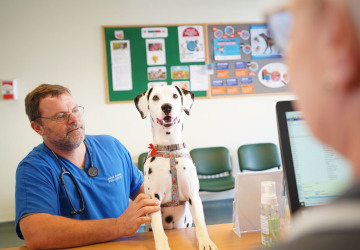
Is heart disease common in cats? Know the risk factors and symptoms
October 21, 2023
According to the veterinary team at Edgewood Vets, feline heart disease is relatively common in cats, especially as they age. It is estimated that around 10-15% of all cats may develop some form of heart disease during their lifetime. However, the prevalence of heart disease can vary based on several factors, including breed, age and overall health.
In this article, Veterinary Surgeon Jürgen Theinert explains these factors and the signs cat owners in Essex should look out for. Early diagnosis is crucial to getting your cat the treatment they need.
Heart disease risk factors in cats
Breed
Jürgen wants Essex cat owners to know that unfortunately, no cat is immune to the risks of heart disease. However, certain cat breeds, such as Maine Coons and Ragdolls, have a higher predisposition to certain types of heart disease, like hypertrophic cardiomyopathy (HCM). HCM is one of the most common forms of heart disease in cats and involves the thickening of the heart muscles, leading to impaired heart function.
HCM has been shown to be inherited in purebred cats like Maine Coons and Ragdolls, often by genetic mutation. Other predisposed breeds for HCM and heart disease include the British Shorthairs, Persian, and Sphynx. Male cats are slightly more commonly affected.
Spotting Heart Disease at home
Age
Age is another significant factor. As cats age, their risk of developing heart conditions increases. Feline heart disease tends to occur more frequently in middle-aged and older cats, typically around 5 to 10 years and older.
Health
There are several health conditions that can increase the likelihood of feline heart disease, some of these are listed below. Jürgen stresses that not all cats with the below health conditions will develop heart disease:
- Hypertension (High Blood Pressure): High blood pressure can strain the heart and blood vessels, leading to various heart problems, including hypertrophic cardiomyopathy (HCM) and heart failure.
- Hyperthyroidism: This condition occurs when the thyroid gland produces an excess of thyroid hormones. Untreated hyperthyroidism can lead to an increased heart rate and stress on the heart.
- Obesity: Overweight and obese cats are at a higher risk of developing heart disease due to the increased workload on their hearts.
- Diabetes: Cats with diabetes may be at a higher risk of developing heart disease due to the metabolic changes associated with the condition.
- Feline Heartworm Disease: Thankfully not found in the UK, feline heartworm disease can be a risk for cats travelling abroad. This parasitic infection (transmitted by mosquitos) can cause heart and lung damage, so Jürgen advises that precautions should be taken for cats who leave the UK or are adopted from overseas.
- Chronic Kidney Disease (CKD): Cats with CKD can develop secondary heart problems due to fluid imbalances and increased strain on the heart.
- Infections: Certain infections, like feline infectious peritonitis (FIP), can cause inflammation in the heart and lead to heart disease.
- Anaemia: Severe anaemia can reduce the oxygen-carrying capacity of the blood, placing additional stress on the heart.
If you have any concerns about your cat and feline heart disease, contact us to book a heart check-up with one of our veterinary surgeons.
Contact us to book a heart check-up
Signs of heart disease in cats
Heart disease in cats can be challenging to detect, especially in its early stages, as cats are known for hiding signs of illness. Jürgen recommends regular check-ups for cats of all ages (but especially cats over 5 years and those pre-disposed) at our Purleigh practice, as early detection and intervention can lead to better disease management and improved quality of life.
There are however some symptoms of feline heart disease that you may be able to spot at home. Take a look at Edgewood Vets’ fact sheet: Heart Disease in Cats Symptoms
If you notice any signs or have concerns about your cat’s heart health, it’s crucial to contact us to book a check-up promptly.
Jürgen, or another of our vets, will perform a physical examination, listen for any abnormal heart sounds, and may recommend further tests, such as echocardiography, to evaluate your cat’s heart health.
Heart disease in cats symptoms to spot at home
Share our guide with other cat owners and help us to help other pets in Essex.






